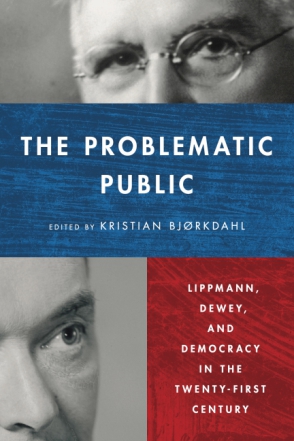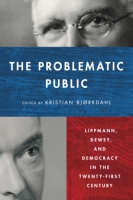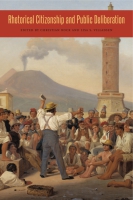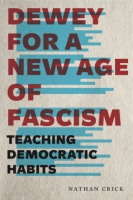
The Problematic Public
Lippmann, Dewey, and Democracy in the Twenty-First Century
Edited by Kristian Bjørkdahl
The Problematic Public
Lippmann, Dewey, and Democracy in the Twenty-First Century
Edited by Kristian Bjørkdahl
“Intrinsic to the tradition of democratic politics is debate over the nature of democracy itself, and Bjørkdahl’s volume is a worthy contribution to our perennial deliberations. Its chapters examine the influential democratic theories of two of the most prominent public intellectuals of the twentieth century—philosopher John Dewey and journalist Walter Lippmann—and show how their penetrating analyses can help us navigate the serious challenges facing democracy in the twenty-first century.”
- Description
- Reviews
- Bio
- Table of Contents
- Sample Chapters
- Subjects
Lippmann and Dewey were only two of many twentieth-century thinkers trying to imagine how a modern industrial democracy might (or might not) come to pass, but despite that, the “Lippmann/Dewey debate” became a symbol of the two alleged options: an epistocracy, on the one hand, and grassroots participation, on the other. In this book, distinguished scholars from rhetoric, communication, sociology, and media and journalism studies reconsider this debate in order to assess its contemporary relevance for our time, which, in some respects, bears a striking resemblance to the 1920s. In this way, the book explains how and why Lippmann and Dewey are indispensable resources for anyone concerned with the future of democratic deliberation and decision-making.
In addition to the editor, the contributors to this volume include Nathan Crick, Robert Danisch, Steve Fuller, William Keith, Bruno Latour, John Durham Peters, Patricia Roberts-Miller, Michael Schudson, Anna Shechtman, Slavko Splichal, Lisa S. Villadsen, and Scott Welsh.
“Intrinsic to the tradition of democratic politics is debate over the nature of democracy itself, and Bjørkdahl’s volume is a worthy contribution to our perennial deliberations. Its chapters examine the influential democratic theories of two of the most prominent public intellectuals of the twentieth century—philosopher John Dewey and journalist Walter Lippmann—and show how their penetrating analyses can help us navigate the serious challenges facing democracy in the twenty-first century.”
Kristian Bjørkdahl is Associate Professor of Rhetoric in the Department of Linguistics and Scandinavian Studies at the University of Oslo.
Acknowledgments
Introduction: Lippmann, Dewey, and Democracy in a Hailstorm
Kristian Bjørkdahl
1 A “Constituency of Intangibles”: Walter Lippmann’s Plea for a Better Democracy
Michael Schudson
2 The Lippmann/Lippmann Debate: What Role Do Social Movements Play in Democratic Politics?
Nathan Crick
3 From the Illusions of Democracy to the Realities of Its Appearances
Bruno Latour
4 Debates Conjured, Debates Forgotten
Anna Shechtman and John Durham Peters
5 Societal Embedding of the Lippmann/Dewey Debate: From Opinion Expression to Opinion Polling and Mining
Slavko Splichal
6 The Lippmann/Dewey Debate in the History of Twentieth-Century Progressivism
Steve Fuller
7 Propaedeutic Rhetorical Citizenship: Deweyan Impulses in Danish Community-Building
Lisa S. Villadsen
8 A Public and Its Solutions: Lippmann and Dewey Through the Prism of Norwegian Social Democracy
Kristian Bjørkdahl
9 Democracy Now: Recovering the Political Pragmatism of Walter Lippmann and John Dewey
Scott Welsh
10 Democratic Deliberation, Identity, and Information
Patricia Roberts-Miller
11 Rhetorical Sociology and the Management of Public Discourse
Robert Danisch and William Keith
List of Contributors
Index
Download a PDF sample chapter here: Introduction
Also of Interest
Mailing List
Subscribe to our mailing list and be notified about new titles, journals and catalogs.





